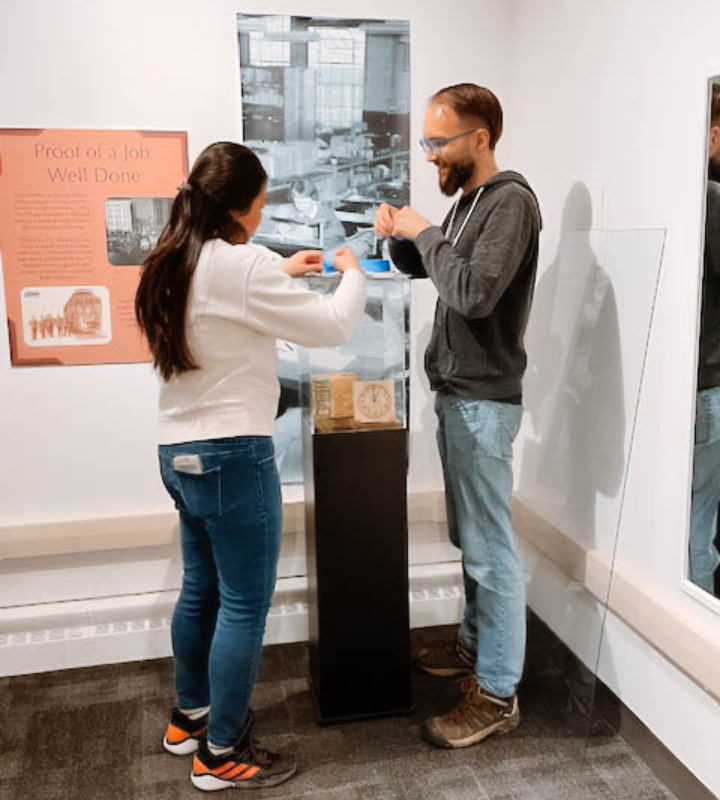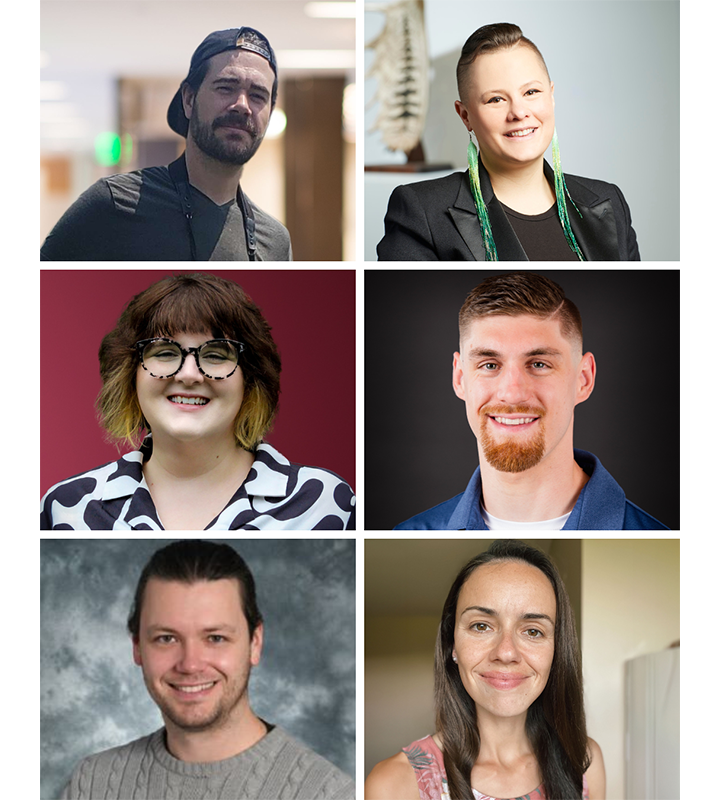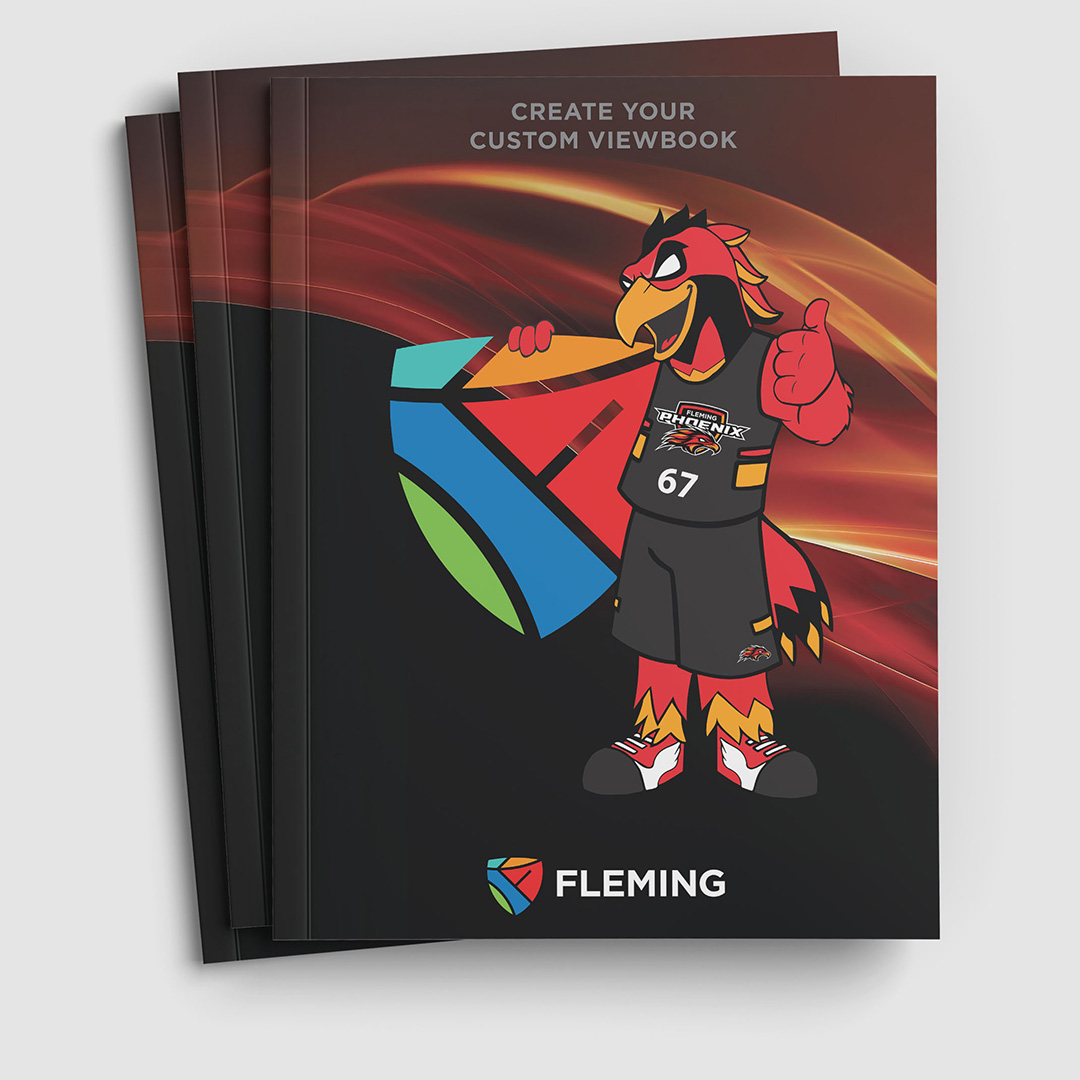Museum Management and Curatorship
Museum Management and Curatorship is an intensive, fast-paced, immersion experience that provides applied training for careers in the museum, gallery or heritage sectors. Approximately 75% of classes are held at the Peterborough Museum & Archives.
Program Information
Start Date
September 08, 2026
Domestic Availability
Accepting Applications
International Availability
Closed
CIP Code
30.1401
Program Code
ACM
Delivery
In Person, Placement
Credential
Ontario College Graduate Certificate
Academic School
Location
Program Contact
Domestic Tuition
per semester*
International Tuition
per semester*
*Domestic tuition amounts shown are from the 2025-2026 academic year and are subject to change.
*International tuition amounts shown are from the 2025-2026 academic year and are subject to change.
Apply Now
Canadian StudentsView Curriculum
Make history come alive, create meaningful stories by documenting and preserving our heritage for today and future generations.
Museum Managers and Curators don't just preserve the relics, stories, and memorabilia of the past. They animate and interpret it, bringing history to life for people of all ages and stages. Put your university degree or college diploma to work in the service of a society that needs to know its past -- in order to inform its future.
You will take this post-graduate certificate program during three consecutive semesters. The program is designed to meet the needs of students who want to acquire applied skills-based training for careers in the museum/gallery or heritage sectors. The courses have been developed in consultation and co-operation with museums and heritage organizations in order to offer a real, not simulated, work experience. Updated curriculum reflects practical applications of theory, beyond best practices rooted in ethical applications. The program is an optimal blend of independent study, in-class lectures, discussion, group work, applied projects, experience based and priceless hands-on learning.
The Peterborough Museum & Archives, a City-owned and operated institution, is the program's main learning partner, and has designated spaces for Fleming students. This is where you will attend the majority of your lectures. As well, you will do practical training at this museum. Find out more information about the museum at: www.peterboroughmuseumandarchives.ca
Students find it more convenient to look for accommodation near the museum or downtown, as opposed to on campus.
Classes are also held in the dedicated conservation laboratory and computer labs at the College's Sutherland Campus.
By being immersed in museum work, you'll experience the complexity and diversity of tasks/duties in small to medium-sized museums or galleries and acquire training to be an expert generalist. You will need to complete site work, research, and group projects and be prepared for off-campus teaching outside of "regular" day classes.
The Museum Management and Curatorship program at Fleming College provided me with a rewarding, hands-on, and well-rounded museum experience. All of the courses offered, provided information that I still use today. The courses in Collections Management, Exhibit Design, Curatorial Research, Education and Interpretive Programming, Museum Administration, Archival Management, Care of Collections, and the Internship create a well-rounded experience. As a graduate of the program and a supervisor since then, I often look for students from the program when hiring. I find the students from Fleming are independent, have great hands-on experience, and already come with a well-rounded foundation. Faculty were extremely friendly and approachable. I definitely recommend the program. I wouldn’t be where I am today without it.
Amber Laurie, Program Graduate - Assistant Curator/Registrar of Marine History, Nova Scotia Museum Collections Unit, Maritime Museum of the Atlantic
Deciding to attend Fleming College’s Museum Management and Curatorship program was one of the best decisions I have ever made. The instructors are extremely knowledgeable, drawing from their own extensive experience in museum work, and are passionate, kind educators who provide all the skills necessary to succeed in the field. As a partner with the Peterborough Museum and Archives, the program allowed me to gain real-world experience through a number of practical assignments that has been instrumental in securing employment. I am very grateful for everything the program taught me and would recommend Fleming College to anyone interested in the heritage field.
Emily Dykeman, Program Graduate - Collections Assistant - Tom Thomson Art Gallery
The Fleming Museum Management and Curatorship program’s broad course content allowed me to gain hands-on experience working with artefacts, developing exhibits, and creating educational programming while still having a solid focus on the day-to-day operational demands of museums. The program provided me with the strong and varied foundation necessary to administer a community museum and allowed me to identify areas of museum work that I am most passionate about.
Margaret Mulrooney, Program Graduate - Curator/Administrator, Colchester Historeum
As a museum manager, I have found interns and graduates from the Fleming Museum Management and Curatorship and Cultural Heritage Conservation and Management programs to be motivated, skilled and committed to a career in the heritage sector. Following a recent nationwide search for an Assistant Curator/Collections Coordinator, our top two choices out of more than 250 applicants were both Fleming grads."
John Summers, M.M.St., Employer, Manager Heritage Resource Management Planning and Economic Development Tourism and Culture, City of Hamilton
The Museum Management and Curatorship program is one of the few available to students interested in this field and is unique in Canada, in that it is actually based at a museum. The post-graduate certificate is highly regarded by heritage and cultural institutions, galleries, museums, and graduates. The program benefits from strong partnerships and support from museums and galleries both in Ontario and across the country.
Due to the nature of this program, a significant amount of time is spent working in teams in the field, and on practical projects.
The third and final semester is a challenging, full-time, four-month, curriculum-based internship at an approved site. This will give you hands-on work experience where you will put your hard work and studies into action. Students should be prepared to relocate for the internship, to pay full tuition, and be self-supporting. The internship is usually an unpaid study experience. You will negotiate your own internship with faculty assistance and some students have participated in internships abroad. Students are responsible for negotiating additional paperwork and funding requirements for international internships including visas, travel and insurance. Some examples of internship locations include:
- Metro Toronto Zoo
- Museum of Ontario Archaeology
- National Trust, England
- Nova Scotia Museums
- Ontario Museum Association
- Peterborough Museum & Archives
- Provincial Archives Associations
- Robert McLaughlin Gallery
- Royal Ontario Museum
- Royal Tyrrell Museum
- UBC Museum of Anthropology
All course work must be successfully completed in order to be eligible for the internship. Satisfactory completion of the internship is a prerequisite for graduation.
- an interest in and respect for history, culture, art and heritage
- manual dexterity
- public relations skills
- ability to work with people of all ages
- cultural sensitivity/awareness
- ability to prioritize tasks and meet multiple demands under pressure
- proven time management, planning and teamwork skills
- flexibility and organizational skills
- excellent communication and writing skills
- experience with digital photography
- sense of humour
Experience or certification in the following are assets:
- Digital photography
- Adobe Suite (Photoshop, InDesign, Illustrator)
- Ladder Training (required), Fall Arrest Training, or Working at Heights
- French language skills
- Fire Prevention Training
- Firearms Possession and Acquisition Licence (P.A.L.) (to work in military museums and many community museums)
- Experience working with databases
- Smart Serve Food Handling
- Other languages
- Valid driver's licence
- AODA Training
You'll find employment at historic sites, parks, zoos, monuments, living history sites, museums, galleries, and in heritage/arts/cultural education. Job titles include:
- collections manager/registrar
- curator
- digital content and marketing co-ordinator
- education officer
- exhibit designer
- fundraiser
- museum interpreter/guide/animator
- museum manager
- outreach co-ordinator
- public programming and special events lead
An initial job after graduation most likely will be a contract position, but you'll progress from there to more permanent, full-time employment. There's a high employment rate in the field following graduation.
Books/supply costs are approximately $1600 a year. Additional fees may be required for field trips or specialized workshops. A laptop with up-to-date Adobe Creative Suite software and a digital SLR camera are assets. Students should also consider taking advantage of student rates to join industry professional associations
If you have a complex medical history, we strongly advise you to discuss your concerns with the program co-ordinator, and to consult with your doctor. You must update Tetanus and all immunizations prior to the start of classes. In addition, students are required to pay certification fees and present current certification for Standard First Aid, CPR (C Level), WHMIS (G.H.S.) training and Ladder training. Please provide proof of all documentation at the start of classes in the fall (do not send this ahead of time). Links to mandatory free AODA training will be provided to those who are accepted into the program.
- Adhere to recognized professional, legal and ethical standards to ensure the management, development, growth, stewardship and day to day operations of museums, galleries and archives.
- Develop, manage and maintain collections and associated documentation that reflect the governing organization's mission.
- Monitor, protect and maintain artifacts in storage, on display and in transit.
- Apply knowledge of the key characteristics of common materials in museum collections and causes of deterioration in order to implement effective preservation strategies.
- Demonstrate a basic understanding of archival management principles and practices.
- Respect needs and experiences of individuals, families and communities and their associated material history culture.
- Apply and integrate relevant knowledge of the history, development and philosophy of museums and the evolving museum profession in order to effectively promote and understand the arts, heritage and culture.
- Collect, research, document, interpret and preserve tangible and intangible heritage.
- Research, plan, construct, promote and evaluate outreach, public and school programs, touring exhibitions and temporary and permanent exhibitions.
- Apply business and management principles and practices, including planning and policy development to non profit and for profit sectors.
- Generate revenue through fundraising and grantsmanship by applying sound business principles.
- Contribute to strategies for effectively managing the performance and development of staff and volunteers in museums.
- Communicate and collaborate in an effective professional manner.
- Identify and implement strategies to improve job performance and promote personal and professional growth in a rapidly changing, complex work environment.
Students applying to Museum Management and Curatorship must meet the following requirements:
- Undergraduate degree, Ontario College diploma or Ontario College Advanced diploma or equivalent.
In The News: Museum Management and Curatorship

Orientation is like a pilot episode of a TV show. You’ll meet a bunch of people, forget half their names, and then slowly figure out what’s going on.
Don’t stress, you’re not alone. Everyone’s winging it just like you are.
First, allow me to introduce myself. My name is Bryce Jones, and I’m enrolled in Fleming College’s Mental Health and Addictions Worker – Social Service Worker Dual Diploma program. I wrote this guide for you because when I finished Orientation at Fleming, I regretted not looking into the events on campus more, so I could be involved from day one.
Here’s what you need to know.
Navigating Campus
Let’s be honest, you’re going to get lost at least once. Fleming is split into four wings: A, B, C, and D. I found it easiest to use the Student Services desk and the bridge between A and B as my main landmarks. Both are near the main entrance, which is probably where you'll come in. If you keep walking through the big open foyer and pass the giant screen, you’re officially in C Wing. It's a bit spread out, but both staircases in that area will lead you to different parts of it. Keep going past the stairs, past Tim Hortons and Pizza Pizza, down a hallway, that’s D Wing. All the beginnings of hallways have signs with the rooms posted; just make sure to look up when entering a new area, and you’ll be okay.
Getting Involved
Talk to strangers (on purpose)
Orientation is one of the few times it’s not weird to introduce yourself to random people. Say “hi” in line, at events, in the hallway. Most friendships start like that here. I made many friends (and I would classify myself as a shy nerd) just by opening up a tiny bit. A simple, “What program are you in?” goes a long way.
How to Study in College
Studying isn’t one-size-fits-all. Here’s how I make it work at Fleming.
Know Your Spaces
- The Library: Quiet floors, study rooms, and long hours. It’s my go-to for getting in “the zone.”
- Peer Tutoring: It’s available for most programs, but be sure to book sessions early (especially around midterms)! Don’t feel silly for asking for help; it’s smart to recognize when you need it.
- Study Rooms: Some wings have open rooms or nooks you can use (C Wing is a goldmine). Just bring headphones.
Study Smarter, Not Longer
- Try the Pomodoro Technique: 25 minutes of studying followed by a 5-minute break on repeat for four intervals before taking a longer break.
- Make playlists or find ambient background noise (my favourite is a lo-fi album released by Sublime!)
- Study with friends and help hold each other accountable.
Where to Eat/Hangout
So, enough about school, let’s talk food and vibes. Whether you're in between classes, cramming for midterms, or just looking for a place to chill, here’s where to go!
On Campus
- Tim Hortons & Pizza Pizza: Great for quick bites, but lines get long around lunch, so plan accordingly.
- The cafeteria: Rotating hot meals, snacks, coffee, and lots of seating. It's a good spot to hang out between classes. There’s also a piano—how fun?!
Off Campus
- Riley’s Pub & Maple Moose are local student pub faves, great for a night out on the town or a quick date.
- Kawartha Dairy on hot days, or NG Saigon Boys if you're craving takeout.
- Need a place to hang downtown? Try Smitty's, great coffee and a cozy study spot.
- Gerti's has a great atmosphere, drinks, service, and food.
- Ghost Taco delivers chef-inspired tacos, and it’s my personal favourite to order right now.
Bonus Tips
- If you plan on using the bus for transportation, download an app called Moovit. It functions like Google Maps, but with more accurate bus times.
- Add MyCampus to your home screen! Click the 3 dots if you’re using Chrome, or if you’re using Safari,?navigate to the website in Safari, tap the share icon (square with an arrow), scroll down, and select "Add to Home Screen”.
My Experience
Each friend I’ve made at Fleming has helped me grow into the person I’ve always wanted to be. There’s something powerful about being surrounded by classmates who are all here to build something better for themselves and their communities. Good luck this fall and make the most of your time here!
Get the inside scoop on campus life, student experiences, and expert tips.
From hidden study spots to career advice, our blog is your go-to source for insights, inspiration, and everything in between. Have an inspiring journey, a unique campus experience, or a success story to share? Submit your blog idea to the Fleming Connect team for your chance to showcase your story to the entire Fleming community.

Looking to gain an edge in your field or pivot to a new one entirely? Fleming College’s post-graduate programs are designed to support you in the next chapter of your career. Whether you're building on your undergraduate degree, returning to school to refine your skills, or applying a credential to the knowledge and experience you've gained in the field, our post-grad certificates and diplomas blend real-world experience with practical, career-focused training.
What is a post-graduate program?
A post-graduate program is designed for students who already hold a college diploma or university degree, and/or have relevant work experience. These programs, which range from two to four semesters, are perfect for those looking to sharpen their skills, specialize in a niche field, or transition into a new career.
Why Choose Fleming?
Fleming College's post-graduate programs are shaped by the needs of the job market and powered by strong community and industry partnerships. Many of our programs include internships, co-ops, or field placements to give you valuable, hands-on experience before you graduate.
You'll also benefit from:
- Access to expert faculty with industry experience;
- Career support, resume help, and job search guidance; and
- A welcoming, supportive learning environment
Explore Fleming’s Post-Graduate Programs
School of Environmental and Natural Resource Sciences
- What you’ll learn about: In addition to food production, you will learn about aquaculture activities, including the production of fish for conservation and production for ornamental species. You’ll also gain valuable experience with zebrafish (a key model species in ecotoxicology and biomedical research).
- Career opportunities: Food Production, Conservation, Aquaponics, and Pond/Garden Markets.
- Duration: 2 semesters
Environmental Land Management – Canadian Context
- What you’ll learn about: Discover how to turn your passion for creating more liveable, sustainable communities into a career in Canada’s environmental sector.
- Career opportunities: Municipal Land Use Planning, Urban Planning, Parks and Recreation Planning, Transit Planning, Environmental Planning, Management Consultancy.
- Duration: 4 semesters
School of Business
- What you’ll learn about: Learn how to design and create software by embedding AI into applications that meet industry needs. Modern software design and AI frameworks, machine learning, and big data fundamentals are the basis of this program.
- Career opportunities: AI Engineer, Programmer, Business Intelligence Developer, Data Analyst, Research Scientist/Engineer, Software Engineer/Architect, Machine Learning Engineer, and more.
- Duration: 2 semesters
- What you’ll learn about: You will learn about various digital tools and technologies, how to create project management frameworks, digital strategies and tactics, and more.
- Career opportunities: Digital Marketing and Communications, Marketing Project Management, Advertising Accounts Management, and Media Coordination.
- Duration: 2 semesters
Haliburton School of Art + Design
Cultural Heritage Conservation and Management
- What you’ll learn: This program prepares you to care for and conserve historical artifacts, with opportunities to work directly with organizations like the Peterborough Museum and Archives.
- Career opportunities: Conservation Assistant, Museum Assistant, Curatorial Assistant, Conservator, Collections Care Coordinator, Museum Registrar, and more.
- Duration: 4 semesters
Museum Management and Curatorship
- What you’ll learn: Develop curatorial and exhibit planning skills while learning the ins and outs of non-profit administration and museum operations. Intern at partner institutions and gain real-world museum experience.
- Career opportunities: Collections Manager, Curator, Digital Content and Marketing Coordinator, Education Officer, Exhibit Designer, Fundraiser, and more.
- Duration: 3 semesters
School of Health and Community Services
Health Care Management – Canadian Context
- What you’ll learn: Learn about health law, policy, human resources, and financial management—preparing you for administrative and coordination roles in hospitals, clinics, and NGOs.
- Career opportunities: Graduates may work in settings such as clinics, hospitals, long-term care facilities, private facilities and home care.
- Duration: 4 semesters
Perioperative Nursing (RN and RPN)
- What you’ll learn: Training covers everything from sterilization and surgical instrumentation to interprofessional communication in high-pressure environments.
- Duration: 1 semester
Community Collaboration in Addictions and Mental Health
- What you’ll learn: You'll explore how professionals collaborate to deliver impactful public services, gaining hands-on experience with inclusive, client-centred strategies that support individuals, families, and communities.
- Career opportunities: Community mental health worker, outreach coordinator, crisis intervention specialist, and more.
- Duration: 2 semesters
How to Apply to a Post-Graduate Program at Fleming College
To enrol in a post-graduate program at Fleming, you’ll need to have a college diploma or university degree from a recognized institution (or, in some cases, a minimum amount of relevant work experience). Some programs may have additional requirements (such as a healthcare license or specific academic background), so be sure to review the admission criteria for your program of interest.
Most applications require:
- Official transcripts
- Resume
- Statement of interest
- (Optional) Letters of recommendation
Application deadlines vary by program. We recommend applying early to secure your spot.
Whether you’re diving deeper into your field or charting a new path, a post-graduate program at Fleming College can help you get there with confidence and purpose.
Get the inside scoop on campus life, student experiences, and expert tips.
From hidden study spots to career advice, our blog is your go-to source for insights, inspiration, and everything in between. Have an inspiring journey, a unique campus experience, or a success story to share? Submit your blog idea to the Fleming Connect team for your chance to showcase your story to the entire Fleming community.

Peterborough, ON – (April 9, 2025) – The Peterborough Museum & Archives is inviting the community to a special opening celebration for its newest exhibit, Collecting Memories: Objects That Define Us, on Thursday, April 17, 2025, from 2 to 4 p.m. in the Heideman Gallery.
The exhibit is a collaboration with students from Fleming College’s Museum Management and Curatorship program. Working as a team, students researched, wrote, planned and designed the exhibit, which explores the personal and shared significance of everyday objects in shaping memory and identity.
The partnership gives students valuable hands-on experience that brings their learning to life. This year’s exhibit explores how personal objects connect individuals to the past, spark memory and tell powerful stories.
Opening remarks will begin at 2:30 p.m. Light refreshments will be served, and all are welcome. Admission is by donation.
The exhibit opened to the public on Saturday, March 29, 2025, and will remain on display until Sunday, June 15, 2025.
For more information, visit: https://www.peterborough.ca/recreation-culture-social-services/events/
About Fleming College
Fleming College respectfully acknowledges that we are situated on Michi Saagiig Anishinaabeg lands and territory. Located in the heart of Central Ontario, Fleming College has campus locations in Peterborough, Lindsay, Cobourg and Haliburton. Named for famous Canadian inventor and engineer Sir Sandford Fleming, the college features more than 85 full-time programs in Arts and Heritage, Business, Environmental and Natural Resource Sciences, General Arts and Sciences, Health and Wellness, Justice and Community Development, Skilled Trades and Technology, and Continuing Education. Fleming College has more than 6,800 full-time and 10,000 part-time students, and 80,000 alumni.
For media inquiries, please contact:
Elise Moore
Communications Officer
Elise.moore@flemingcollege.ca
Find us online:
Web: flemingcollege.ca
Facebook: facebook.com/flemingcollege
X: @FlemingCollege on Twitter
Instagram: @flemingcollege on Instagram
TikTok: @flemingcollege on TikTok

Peterborough, ON (October 4, 2024) – Six Fleming College alumni have been selected as nominees for the distinguished Premier’s Awards this year.
Founded in 1992, the Premier’s Awards are administered by Colleges Ontario, the advocacy voice for Ontario’s 24 colleges.
This annual celebration recognizes the important social and economic contributions college graduates make on a provincial and global scale. Colleges can nominate alumni in seven categories: Skilled Trades, Business, Community Services, Creative Arts and Design, Health Sciences, Recent Graduate, and Science, Technology and Engineering.
The Fleming College nominees for 2024 are:
Skilled Trades
Dylan Stadtke: Mechanical Techniques Plumbing (2016), HVAC Technician (2018)
The co-owner of Pristine Plumbing Peterborough, Dylan’s business is thriving, reflecting his dedication to high professional standards and community involvement. In addition to two Fleming diplomas, Dylan completed the Construction Leadership Program at Fleming in 2022, demonstrating his commitment to leadership and excellence in his field. Beyond his professional achievements, Dylan is deeply committed to men’s mental health and is a strong proponent of promoting women in trades. His dedication to these important issues underscores his role as a leader and innovator in his industry.
Health Sciences
Francine Sam: Practical Nursing (2024)
Francine Sam began her nursing career while living in Australia where she was enrolled in university for nursing. She ended up moving to a rural village in northern Uganda where she did humanitarian work for seven years alongside her young family, caring for vulnerable children and their communities. It was through her experiences there that compelled her to further her education at Fleming College. Francine recently graduated as a Practical Nurse and was the Valedictorian of the School of Health and Community Services and is now working as a Registered Practical Nurse in the Emergency Department at her local hospital.
Community Services
Heather George: Museum Management and Curatorship (2008)
Heather George is an influential leader in the Canadian museum sector. As Executive Director of the Woodland Cultural Centre, she advocates for Indigenous perspectives and creates opportunities for Indigenous artists and curators. As the Past President of the Canadian Museum Association and current Vice President for the Indigenous Heritage Circle, Heather advances the Truth and Reconciliation Commission's Call to Action #67, urging museums to engage in reconciliation with Indigenous peoples. In 2021, she led a national review of museum policies in relation to the United Nations Declaration on the Rights of Indigenous Peoples (UNDRIP). This review involved Indigenous communities and museum professionals, culminating in recommendations to change sector standards and develop federal repatriation laws.
Science, Technology and Engineering
Matthew Wilson: Conservation Biology (2024)
In 2022, Matthew Wilson made a significant decision to leave his career in the shipping industry and return to school. He was driven by a desire to pursue a more meaningful path, he chose to focus on addressing the pressing environmental and natural world challenges facing our planet today. Matt has always had a deep passion for animals and nature. Over the years, he has worn many hats, including biologist, arboricultural field technician, and research assistant. Recently, Matt enrolled in the Conservation Biology Program at Fleming College, where he graduated as Valedictorian of the School of Environmental and Natural Resources. Driven by a strong desire to make a positive impact on our climate, Matt is committed to preserving our natural legacy for future generations.
Recent Graduate
Jacques Graveline: Business Administration-Marketing (2022)
Jacques Graveline was a Student Ambassador for Fleming Indigenous Student Services and Fleming Student Administrative Council. He graduated from Fleming College with an Advanced Diploma in Marketing in 2022 and has been extremely involved in the College since. Elected as Board Chair at Fleming SAC in 2023, he passionately advocates for students to ensure an exceptional college experience. Jacques is a leader in the Peterborough community, supporting the United Way homeless initiative and Dragon Boat Races for Breast Cancer, while creating and implementing marketing strategies as the Marketing Assistant at Bridges Peterborough. Jacques is currently the Governance and Advocacy Coordinator with the Fleming Student Administrative Council.
Creative Arts and Design
Aaron Robitaille: Graphic Design-Visual Communication Advanced Diploma (2020)
A 2020 graduate of Fleming College’s Graphic Design (GDV) program and recipient of the Muriel Cooper Award for Design Excellence, Aaron launched "Aaron Robitaille Design" and developed notable branding for Haven Brewing Company. Her expertise spans large-scope murals, websites, and mentoring local artists, with work featured across Ontario. She is currently an instructor at Fleming College and acts as Vice Chair and member on Artspace’s Board of Directors, Peterborough’s only artist-run centre. The GDV program’s comprehensive training and community partnerships were pivotal in her success, fostering a blend of art and design that continues to drive her career and contributions to the local arts community.
The Premier’s Award nominees will be recognized at a gala event in Toronto on November 25, where the winners will be announced.
To nominate a deserving Fleming graduate for a 2025 Premier’s Award, please contact the Advancement and Alumni Relations Office at 705-749-5530 ext. 1197 or email alumni@flemingcollege.ca.
For media enquiries, please contact:
Asher Lurie
Director, Communications
asher.lurie@flemingcollege.ca
About Fleming College
Fleming College respectfully acknowledges that we are situated on Michi Saagiig Anishinaabeg lands and territory. Located in the heart of Central Ontario, Fleming College has campus locations in Peterborough, Lindsay, Cobourg and Haliburton. Named for famous Canadian inventor and engineer Sir Sandford Fleming, the college features more than 100 full-time programs in Arts and Heritage, Business, Environmental and Natural Resource Sciences, General Arts and Sciences, Health and Wellness, Justice and Community Development, Skilled Trades and Technology, and Continuing Education. Fleming College has more than 6,800 full-time and 10,000 part-time students, and 80,000 alumni.
Web: flemingcollege.ca
Facebook: facebook.com/flemingcollege
Twitter: @FlemingCollege on X
Instagram: @flemingcollege on Instagram
TikTok: @flemingcollege on TikTok
